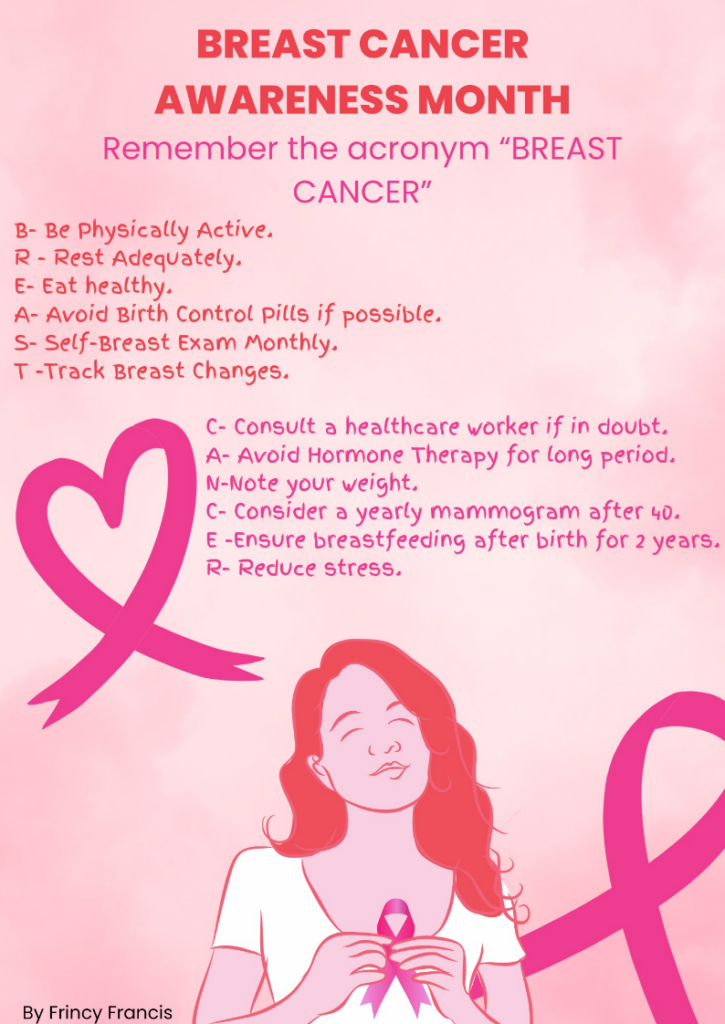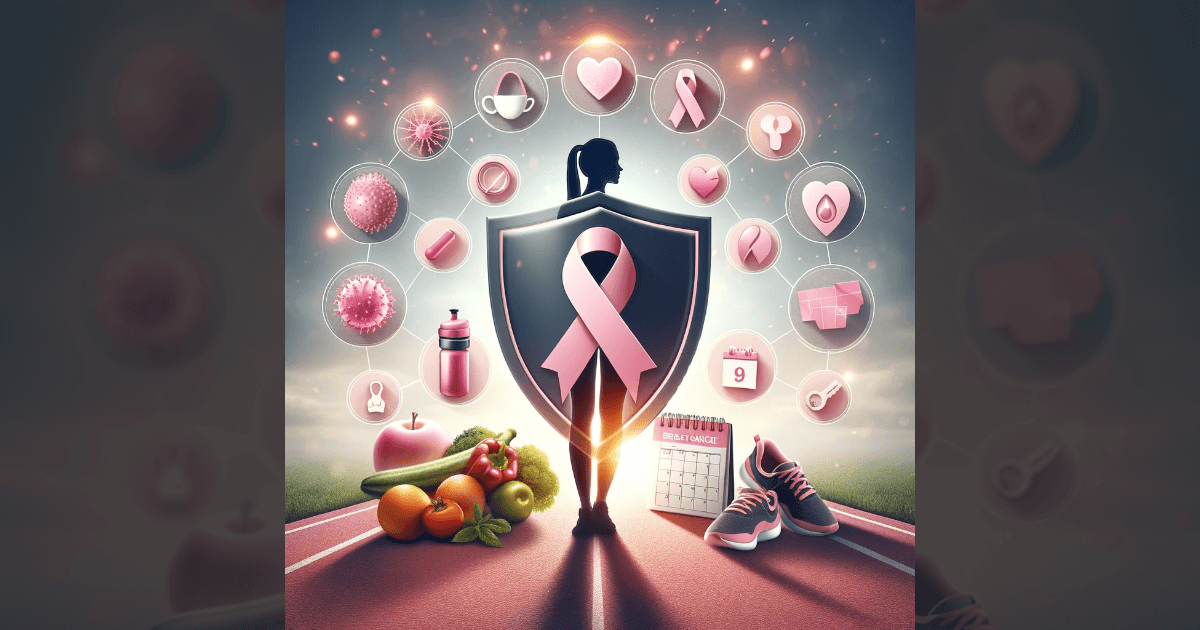
Take note of the acronym “Breast Cancer” to be aware about the prevention of breast cancer.
October is designated as Breast Cancer Awareness Month. The second most common malignancy among women is breast cancer. A woman has a 1 in 39 (or around 2.5%) chance of dying from breast cancer. Since 1989, there has been a steady fall in the number of breast cancer deaths, with a projected 43% decrease by the year 2020. Better treatments as well as earlier detection of breast cancer through screening and more awareness are thought to be the causes of the decline in death rates. However, in recent years, the trend has marginally halted.
By raising enough awareness of breast cancer prevention and early detection, the decline is still possible. Changes in lifestyle and a few thoughtful suggestions are laid out in the acronym “Breast Cancer”.
B – Be physically active:
The World Health Organization highlights the need for regular exercise. All movement, whether done for recreation, transportation to go to and from locations, or as part of a person’s job, is considered physical exercise. Both vigorous and moderate physical activity are beneficial to health. It has been demonstrated that regular exercise helps control and prevent noncommunicable diseases like diabetes, heart disease, stroke, and several malignancies. Additionally, it lowers blood pressure, supports a healthy body weight, and enhances mental health, wellbeing, and quality of life. Every day, one should engage in at least 30 minutes of exercise.
Both vigorous and moderate physical activity are beneficial to health.
R- Rest Adequately:
Overall, getting enough sleep is essential for preserving our health and wellbeing. Rest aids in preventing injuries and enhancing performance by giving our bodies time to heal. Additionally, it promotes a healthy immune system, eases inflammation, and helps muscles rebuild themselves. Additionally, getting enough sleep lowers stress. Rest means getting enough sleep. A solid 7 to 8 hour sleep cycle is crucial.
E – Eat Healthy:
A range of healthful meals are part of an eating regimen that supports weight management and overall health. Consider adding a variety of colours to your plate as if you were eating the rainbow. Dark, leafy greens, oranges, tomatoes, even fresh herbs, are all incredibly nutrient-dense foods.
A – Avoid Birth Control Pills if possible:
Birth control pill use, whether recent or current, has been demonstrated to slightly increase the risk of breast cancer.
S- Self Breast Examination:
Understanding how to conduct a breast self-examination is crucial. It helps in early detection and can be done monthly.
T – Track Breast Changes:
The alterations the breast experiences make breast cancer symptoms obvious. A woman will notice changes in her breasts’ and nipples’ shapes, discharges, puckered skin, and redness.
Mammograms are for many women the best technique to detect breast cancer at an early stage, when it is less difficult to cure and before it becomes large enough to feel or produce symptoms.
C: Consult a healthcare worker:
It is always beneficial to consult a healthcare professional. They can perform a clinical breast examination that aids in spotting any alterations to the breast tissues. Any changes you notice should be reported for more analysis.
A: Avoid Hormone Replacement Therapy for a long period:
Steer clear of long-term hormone replacement therapy. Long-term usage of hormone replacement therapy has been linked to an increased risk of breast cancer.
N: Note your weight:
The risk of developing a number of diseases has been connected to weight gain. Obesity is seen as a risk factor for developing breast cancer. It is really crucial.
C: Consider a yearly mammogram:
Take into account a yearly mammogram: Mammograms are for many women the best technique to detect breast cancer at an early stage, when it is less difficult to cure and before it becomes large enough to feel or produce symptoms. Regular mammograms can reduce the risk of breast cancer-related death. Mammograms are typically advised after age 40.
E- Ensure breastfeeding:
Breast cancer risk has been shown to reduce with continued nursing. While a baby can be breastfed exclusively for the first six months of life, it is encouraged to continue nursing for at least two years.
R – Reduce Stress:
Many epidemiological studies have looked into the connection between stress and cancer and have found that there may be a causal relationship.
“Composed by: Ms. Frincy Francis’s passion is to teach nursing students the art of maternity nursing and shape them into empathetic nurses. Following this passion, she fulfilled her career as a nurse.Currently she is employed as lecturer in the Maternal and Child Health Dept in Muscat, Oman.”

